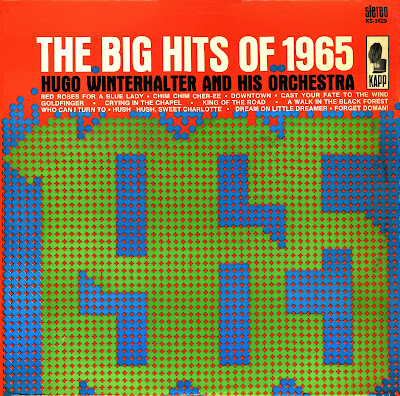I'd hoped to get this up earlier, but things got in the way, I guess. Foul, evil things. Grotesques. Creatures from another place, another time. Nasty, loathsome, dreadful beings.
No, wait--that was only a dream. Never mind. Anyway, I would have assumed that this 1965 Hugo Winterhalter Kapp LP was worth just about what I paid for it: 75 cents. But over at eBay, a dealer in India is asking $51. Fifty-one bucks?? Plus postage. And I also see it up for $8.40, $10, and $18. Hmm.. Maybe it is collectible. Oh, and a still-sealed copy for $39.99. But, seriously, please. What is with these crazy Buy It Now prices? Are they posted in the hope that people will check out eBay and conclude that a pop instrumental LP by Hugo Winterhalter is a goldmine find? How many people even know who Hugo was nowadays?
And I want to rate this album as excellent in every way, but it's hard to be objective about this song lineup, because (despite its mere one or two rock and roll numbers) it really brings me back to the time and place. Well, save for maybe two titles. Anyway, ever since Mary Poppins (which I watched twice in 1964), I was epically aware of Chim Chim Cheer-ee. As written, the song has a slightly dark tone, being in C minor, and with a spooky, chromatically descending bassline, but Hugo's arrangement goes full Halloween, sounding in spots like a precursor to Being for the Benefit of Mr. Kite. Ingenious scoring, though I think this would have frightened me at age seven or eight.
And, boy, do I remember Red Roses for a Blue Lady, which was on constant AM rotation--and it could have been the same local station which played the Beatles, Beach Boys, and Manfred Mann, because in those days a hit was a hit. Was a hit. I don't remember when radio got formatted. Nor do I remember whose Red Roses version I heard over and over--Vic Dana's? Wayne Newton's? Anyway, I recall not knowing what "blue" meant, so maybe I thought the song was about a female Martian. And I know A Walk in the Black Forest, if not from its initial chart success, then certainly from nonstop oldies play throughout the 1960s, though of course not with the near-Herb-Alpert vibe Hugo gives it here. An interesting touch.
And of course Petula Clark's marvelous Downtown was, for a while, THE Top 40 hit, at least in our market--and former big band arranger HW expertly gives it a very big-band sound--along with ample strings, of course. As for Elvis' Crying in the Chapel, I don't have a firsthand memory of it, though I came to know the tune quite well (courtesy of the Orioles?). Hugo's arrangement has none of the contemplative quality of EP's take--it's brassy, with sharply accented triplets, but not the worse for it. I'm still deciding what I think of this one.
I remember Goldfinger and King of the Road as constant-rotation hits, and Hugo gives them faithful and outstanding charts. I remember being enchanted--a little spooked, even--by Goldfinger's main chord progression, which is just the simple tonic-to-minor-sixth-chord cliché that goes back to Chopin. The trick, in pop, is to go from a tonic triad to a dominant seventh on the bVI. A feeling of suspension happens because bVI is taking the place of ii in the context of tritone chord substitution.
I don't remember Dream on Little Dreamer from its day, but I've loved the Perry Como record since I first heard it (circa 1982). Winterhalter goes for a lighter feel, and with a faster tempo, and it works quite well. As for Who Can I Turn To and Forget Domani, I kind of, sort of remember them from their chart time--Hugo's scoring of the latter is very sprightly, with something of a The Longest Day feel at the start. As for Charlotte, I mainly knew it from the movie (when it aired on TV), though I later thrifted the Al Martino Capitol 45 and liked it. Winterhalter's treatment very much recalls the Patti Page hit.
And I know Cast Your Fate to the Wind from the days of the Sounds Orchestral hit; Hugo slows it down and gives it a EZ-Mexican feel (you've heard of EZ-Mexican, no?), totally removing any Vince Guaraldi feel. I don't know that anyone would guess its Guaraldi origin from this treatment. It drags a bit, but I like it.
Superior charts, and a title list which, for the most part, takes me back to 1965 (or thereabouts), and ten of that year's biggest chart successes. Minus the two which I only sort of, kind of recall. The stereo fidelity is great.
DOWNLOAD: The Big Hits of 1965--Hugo Winterhalter and His Orch. (Kapp KS3429; 1965)
Chim Chim Cher-ee
Dream on Little Dreamer
Red Roses for a Blue Lady
Who Can I Turn To
King of the Road
Forget Domani
Cast Your Fate to the Wind
Goldfinger
A Walk in the Black Forest
Crying in the Chapel
Hush... Hush, Sweet Charlotte
Downtown
(Musical arrangements by Hugo Winterhalter)
Lee








